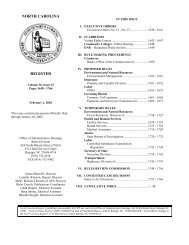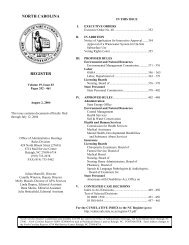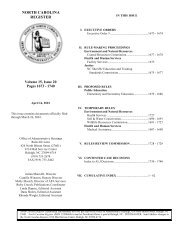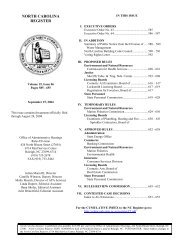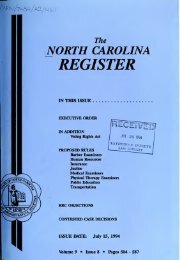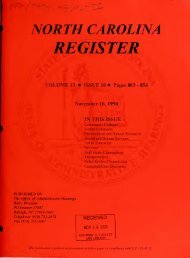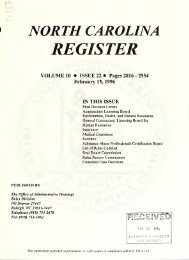NC Register Volume 21 Issue 09 - Office of Administrative Hearings
NC Register Volume 21 Issue 09 - Office of Administrative Hearings
NC Register Volume 21 Issue 09 - Office of Administrative Hearings
You also want an ePaper? Increase the reach of your titles
YUMPU automatically turns print PDFs into web optimized ePapers that Google loves.
PROPOSED RULES<br />
(25)(24) "Pushcart" means a mobile piece <strong>of</strong> equipment<br />
or vehicle which serves hot dogs or foods<br />
which have been prepared, pre-portioned, and<br />
individually pre-wrapped at a restaurant or<br />
commissary.<br />
(26) "Risk Factor" means a contributing factor that<br />
increases the chance <strong>of</strong> developing foodborne<br />
illness as it relates to food safety issues within<br />
a food service establishment, such as approved<br />
sources, cooking temperatures, personal<br />
hygiene, contamination and holding.<br />
(27)(25) "Responsible person" means the individual<br />
present in a food service establishment who is<br />
the apparent supervisor <strong>of</strong> the food service<br />
establishment at the time <strong>of</strong> inspection. If no<br />
individual is the apparent supervisor, then any<br />
employee is the responsible person.<br />
(28)(26) "Restaurant" means a food service<br />
establishment which prepares or serves food<br />
and which provides seating.<br />
(29)(27) "Sanitize" means the approved bactericidal<br />
treatment by a process which meets the<br />
temperature and chemical concentration levels<br />
in 15A <strong>NC</strong>AC 18A .2619.<br />
(30)(28) "Sewage" means the liquid and solid human<br />
body waste and liquid waste generated by<br />
water-using fixtures and appliances, including<br />
those associated with foodhandling. The term<br />
does not include industrial process wastewater<br />
or sewage that is combined with industrial<br />
process wastewater.<br />
(31)(29) "Shellstock" means any shellfish which<br />
remains in their shells. Shellfish which are<br />
shucked or on the half-shell shall not be<br />
considered shellstock.<br />
(32)(30) "Single service" means cups, containers, lids,<br />
closures, plates, knives, forks, spoons, stirrers,<br />
paddles, straws, napkins, wrapping materials,<br />
toothpicks, and similar articles intended for<br />
one-time, one person use and then discarded.<br />
(33)(31) "Substantially similar" means similar in<br />
importance, degree, amount, placement or<br />
extent.<br />
(34)(32) "Temporary food establishment" means those<br />
food or drink establishments which operate for<br />
a period <strong>of</strong> 15 days or less, in connection with<br />
a fair, carnival, circus, public exhibition, or<br />
other similar gathering.<br />
(35)(33) "Utensils" means any kitchenware, tableware,<br />
glassware, cutlery, containers and similar<br />
items with which food or drink comes in<br />
contact during storage, preparation, or serving.<br />
Authority G.S. 130A-248.<br />
15A <strong>NC</strong>AC 18A .2604 INSPECTIONS AND<br />
REINSPECTIONS<br />
(a) Upon entry into a food service establishment, Environmental<br />
Health Specialists shall identify themselves and their purpose in<br />
visiting that establishment. Environmental Health Specialists<br />
shall inquire as to the identity <strong>of</strong> the responsible person and<br />
invite the responsible person to accompany them during the<br />
inspection. If no employee is identified as the responsible<br />
person, Environmental Health Specialists shall invite an<br />
employee to accompany them on the inspection. Following the<br />
inspection, the Environmental Health Specialist shall <strong>of</strong>fer to<br />
review the results <strong>of</strong> the inspection with the responsible person.<br />
(b) The grading <strong>of</strong> restaurants, food stands, drink stands, or<br />
meat markets shall be done on an inspection form furnished by<br />
the Department to local health departments. The form shall<br />
provide for but need not be limited to the following information:<br />
(1) the name and mailing address <strong>of</strong> the facility;<br />
(2) the name <strong>of</strong> person to whom permit is issued;<br />
(3) the permit and score given;<br />
(4) standards <strong>of</strong> construction and operation as<br />
listed in Rules .2607 through .2644 <strong>of</strong> this<br />
Section;<br />
(5) a short explanation for all points deducted;<br />
(6) the signature <strong>of</strong> the Environmental Health<br />
Specialist;<br />
(7) the date.<br />
(c) In filling out the inspection form, points may be deducted<br />
only once for a single occurrence or condition existing within or<br />
outside <strong>of</strong> the food service establishment. Deductions shall be<br />
based on actual violations <strong>of</strong> the rules <strong>of</strong> this Section observed<br />
during the inspection. The Environmental Health Specialist<br />
shall take zero, one-half or a full deduction <strong>of</strong> points depending<br />
upon the severity or the recurring nature <strong>of</strong> the non-critical<br />
violation. Critical violations may be corrected on-site and onehalf<br />
<strong>of</strong> the total point value shall be deducted when the violation<br />
meets all three <strong>of</strong> the following criteria:<br />
(1) the violation has not been documented on<br />
either <strong>of</strong> the two previous inspections;<br />
(2) the violation is recorded; and<br />
(3) correction <strong>of</strong> the item is documented on the<br />
inspection form.<br />
(d) At the time <strong>of</strong> inspection, if a critical violation is observed<br />
and not corrected, the Environmental Health Specialist shall take<br />
on-half or a full deduction <strong>of</strong> points depending upon the severity<br />
or the recurring nature <strong>of</strong> the violation. The Environmental<br />
Health Specialists shall specify a time frame <strong>of</strong> no more than 10<br />
calendar days to correct the critical violation. The<br />
Environmental Health Specialist shall return to the food service<br />
establishment to verify the correction <strong>of</strong> the critical violation and<br />
document the correction on a new "Inspection <strong>of</strong> Food Service<br />
Establishment" form as a visit. The results <strong>of</strong> the critical<br />
violation correction shall not affect the posted grade.<br />
(e)(d) In determining whether items or areas <strong>of</strong> an establishment<br />
are clean for purposes <strong>of</strong> enforcing the rules set forth in this<br />
Section and grading an establishment, the Environmental Health<br />
Specialist shall consider, among other things: the age <strong>of</strong> the<br />
accumulated material, the relative percentage <strong>of</strong> items which are<br />
clean and not clean, the cleaning practices <strong>of</strong> the establishment<br />
and the health risk posed by the circumstances.<br />
(f)(e) Upon request <strong>of</strong> the permit holder or his or her<br />
representative a reinspection shall be made.<br />
(g)(f) In the case <strong>of</strong> establishments that have been closed for<br />
failure to comply with the Rules <strong>of</strong> this Section, a reinspection to<br />
<strong>21</strong>:<strong>09</strong> NORTH CAROLINA REGISTER NOVEMBER 1, 2006<br />
781




